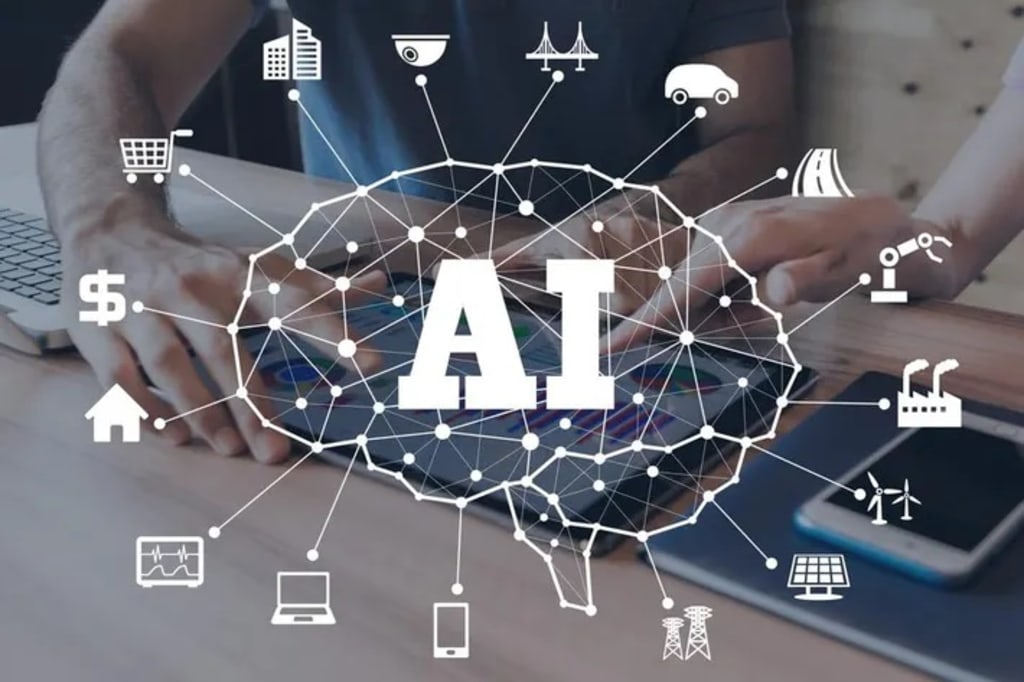The Rise of Artificial Intelligence: How AI Is Transforming Industries and Our Lives
Unleashing the Power of AI: A Paradigm Shift That is Reshaping Our World

Title: The Rise of Artificial Intelligence: How AI Is Transforming Industries and Our Lives
Introduction
Artificial Intelligence (AI) has emerged as a revolutionary force, transforming industries and reshaping the way we live and work. With its ability to analyze vast amounts of data, learn from patterns, and make autonomous decisions, AI is making significant strides in fields such as healthcare, finance, transportation, and entertainment. This article delves into the rise of AI, its transformative potential, and the impact it has on various sectors.
Healthcare: Enhancing Diagnostics and Treatment
AI has become a game-changer in the healthcare industry. Machine learning algorithms can analyze medical records, symptoms, and genetic data to aid in accurate diagnostics. Moreover, AI-powered imaging technology can assist radiologists in detecting diseases like cancer at an early stage, leading to improved patient outcomes. Virtual nursing assistants and chatbots provide personalized care and support, reducing the burden on healthcare professionals.
Finance: Revolutionizing Banking and Investments
The financial sector is leveraging AI to streamline processes, enhance customer experiences, and manage risks. AI-powered chatbots and virtual assistants are transforming customer service by addressing queries promptly and providing personalized recommendations. Robo-advisors use AI algorithms to analyze market trends and optimize investment portfolios, making wealth management accessible to a broader audience. AI algorithms also aid in fraud detection and prevention, safeguarding financial transactions.
Transportation: Advancing Autonomous Vehicles and Logistics
AI is propelling the development of autonomous vehicles, revolutionizing the transportation industry. Self-driving cars, trucks, and drones are equipped with AI systems that process real-time data from sensors, enabling them to navigate roads, avoid obstacles, and enhance road safety. Furthermore, AI algorithms optimize route planning, reducing fuel consumption and improving efficiency in logistics and supply chain management.
Entertainment: Personalized Experiences and Content Creation
The entertainment industry is undergoing a profound transformation with the integration of AI. Streaming platforms employ AI algorithms to analyze user preferences and provide personalized recommendations for movies, shows, and music. AI-powered virtual assistants can engage in natural language conversations, enhancing user interactions. In addition, AI is revolutionizing content creation by generating realistic visuals, enabling deepfake technology, and enhancing special effects.
Education: Tailoring Learning Experiences
AI technologies are reshaping education by providing personalized and adaptive learning experiences. Intelligent tutoring systems leverage AI algorithms to assess individual student performance, identify knowledge gaps, and deliver customized educational content. Virtual reality and augmented reality applications powered by AI create immersive learning environments, enabling students to visualize complex concepts and enhance engagement.
Ethical Considerations and Challenges
While AI offers immense potential, it also raises ethical considerations and challenges. Privacy concerns arise with the collection and utilization of vast amounts of personal data. Bias and fairness issues can emerge if AI algorithms are not carefully designed and tested. Job displacement due to automation is a growing concern, emphasizing the need for reskilling and upskilling the workforce. Striking a balance between technological advancement and ethical responsibility is crucial for harnessing the full potential of AI.
Conclusion
Artificial Intelligence is revolutionizing industries, driving innovation, and transforming the way we live and work. Its impact can be seen in healthcare, finance, transportation, entertainment, and education, among other sectors. As AI continues to evolve, it presents immense opportunities for efficiency, personalization, and problem-solving. However, addressing ethical considerations, ensuring transparency, and fostering responsible AI development are vital to harness its full potential and create a future where humans and machines can coexist harmoniously. With AI as a powerful tool, we have the potential to overcome complex challenges and shape a better tomorrow.
The impact of AI on humans is a complex and multifaceted topic. It is important to note that AI itself is a tool, and its effects on humans depend on how it is developed, deployed, and regulated. Here are some perspectives to consider:
Positive Aspects of AI:
Efficiency and Productivity: AI has the potential to automate mundane and repetitive tasks, allowing humans to focus on more creative and complex endeavors. This can lead to increased productivity and efficiency in various industries.
Improved Healthcare: AI can enhance diagnostics, treatment, and patient care. It enables faster and more accurate analysis of medical data, leading to better disease detection, personalized treatments, and improved patient outcomes.
Advancements in Science and Research: AI's ability to process and analyze vast amounts of data accelerates scientific discoveries and facilitates breakthroughs in various fields, including drug development, climate modeling, and space exploration.
Enhanced Safety and Security: AI technologies can be used to improve public safety and security, such as in surveillance systems, threat detection, and disaster response. It has the potential to mitigate risks and save lives.
Challenges and Concerns of AI:
Job Displacement: Automation driven by AI may lead to job displacement in certain industries, potentially causing economic disruption and unemployment. However, it can also create new job opportunities that require human skills in collaboration with AI systems.
Ethical Considerations: AI raises ethical concerns regarding privacy, data security, and algorithmic biases. Careful design, transparency, and regulations are essential to ensure AI systems are fair, unbiased, and respect privacy rights.
Human-AI Collaboration: Striking a balance between human decision-making and AI algorithms is crucial. Overreliance on AI without critical human oversight can have unintended consequences and limit human autonomy.
Unequal Access and Impact: The widespread adoption of AI may exacerbate existing social and economic inequalities, as access to AI technologies and the ability to harness their benefits may not be evenly distributed across different regions and populations.
In conclusion, the impact of AI on humans is not inherently good or bad. It presents both opportunities and challenges. Responsible development, thoughtful regulation, and ongoing societal discussions are essential to maximize the positive impact of AI while mitigating potential risks and ensuring a fair and inclusive future.
About the Creator
Nowshii
Meet Nowshii, a passionate wordsmith whose storytelling prowess will transport you to mesmerizing realms of imagination.
Enjoyed the story? Support the Creator.
Subscribe for free to receive all their stories in your feed. You could also pledge your support or give them a one-off tip, letting them know you appreciate their work.






Comments
There are no comments for this story
Be the first to respond and start the conversation.